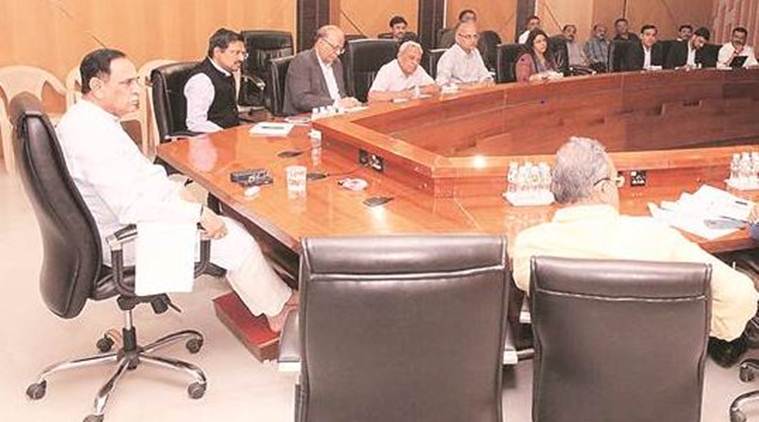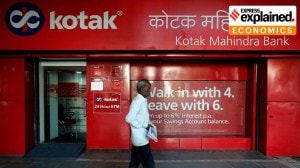- India
- International
Gujarat: Govt to unveil new textile policy ahead of Vibrant Summit
The Gujarat government’s last textile policy was unveiled in 2012 and it expired last year.
 Chief Minister Vijay Rupani with textile industry representatives in Gandhinagar on Saturday. Twitter
Chief Minister Vijay Rupani with textile industry representatives in Gandhinagar on Saturday. Twitter
The Gujarat government on Saturday announced that it will announce a new textile policy ahead of the Vibrant Gujarat Summit, which is scheduled to take place in January, 2019. The announcement was made after Chief Minister Vijay Rupani held a high-level meeting of government officials and stakeholders of the textile sector in Gandhinagar.
The Gujarat government’s last textile policy was unveiled in 2012 and it expired last year. For the last one year, delegates from textile industry had been meeting and making representations to the state government to frame a new textile policy.
“We told the Chief Minister that the industry is being shifted to Navapur and Tarapur in neighbouring Maharashtra, and there would be great problem for the survival of textile industry in Surat. The Maharashtra government gives power at Rs 3.50 per unit, while in Gujarat the textile industry is charged at Rs 7.50 per unit… There was a positive response from the CM, and it was too supported by Energy Minister Saurabh Patel. The Chief Minister told us that a new textile policy has been framed in such a way that the textile industry will progress, and all aspects of the industry have been kept in mind. He also assured that a major demand of reduction in power tariff is also being looked into for amicable solution,” Hetal Mehta, president of Southern Gujarat Chamber of Commerce and Industry (SGCCI), told The Sunday Express after the meeting.
A policy brought under pressure, fallout unknown
Known as the ‘Manchester of the East’, Gujarat contributes 12% of the country’s textile exports. The state is the largest producer of cotton in the country (35%) as well as its exporter (60%), and is the third largest denim producer in the world. However, the industry has been facing a slump for the past few years. The advent of GST in July last year added to the industry’s woes. The Gujarat government, which until now had been dilly-dallying on unveiling its new textile policy, considering that the 2012 policy expired last year, has finally indicated a date to usher in a new outline for the industry. This has more to do with the new textile policy of Maharashtra, where the government has reduced power tariffs and hiked capital subsidy to 45 per cent for spinning mills. There also have been reports of powerlooms moving from Surat to Navapur in Maharashtra. It remains to be seen if the new textile policy helps to rejuvenate the sector that accounts for 6% of the state’s total industrial production.
The SGCCI has demanded power concession of 50 per cent on billed amount for a period of 5 years. In 2012 textile policy, there was power subsidy of one rupee per unit in the billed amount for a period of 5 years.
The SGCCI suggested that there was no capital subsidy in the 2012 textile policy, while in upcoming textile policy of 2018 MMF/cotton/blended weaving, knitting, there should be a ceiling of subsidy amount of Rs 20 crore.

On interest subsidy, they demanded a uniform 7 per cent for MMF/cotton/blended weaving, knitting and its preparatory and technical textiles. In 2012 policy, it was 5 per cent for all textile units and 6 per cent for technical textiles and 7 per cent for spinning.
For modernisation of existing units, they demanded that modernisation, expansion and diversification of the sector be considered without any cap. In the last textile policy, there was a cap of 25 per cent in plant and machinery for upgradations.
Dhriubhai Shah of Yarn Association, Heman Bodawala, a representative from powerloom sector, and Hemant Desai of SGCCI also attended the meeting.
Members of the Gujarat Chamber of Commerce and Industry (GCCI), who also attended the meeting in Gandhinagar suggested that khadi should be promoted in a big way as there was a huge demand for hand-spun yarn in countries like Japan. Many leading brands like Arvind, Raymond and FabIndia have introduced khadi fabric, they stated.
Apart from seeking various incentives, the GCCI also suggested that players in Gujarat should be given benefits that are at par with benefits given in neighbouring states such as Maharashtra, Madhya Pradesh and Jharkhand. Government support was also sought for setting up a testing laboratory for textile sector in Gujarat, similar to the one in Aurangabad.
The GCCI also recommended to drop spinning activity as beneficiary in the new textile policy as the state’s spindle capacity was “enough to consume the state’s production of cotton bales”. “On the contrary, we request the government to extend certain benefits to existing spinning units eligible under the Gujarat Textile Policy 2012 and help them survive,” a statement from the industry body stated.
The Federation of Gujarat Weavers Association (FOGWA), however, opposed the meeting with the CM. “We had not been invited to the meeting. Only business chambers and few textile representatives were called. Not a single member from our association was present in the meeting. We have sought time from the Chief Minister for a meeting where we would put up issues of powerloom sector. We are hoping for a positive response from the state government. We will put forth the issues that are for the betterment of the industry and also for labourers,” FOGWA president Ashok Jirawala said.
Apr 24: Latest News
- 01
- 02
- 03
- 04
- 05






























